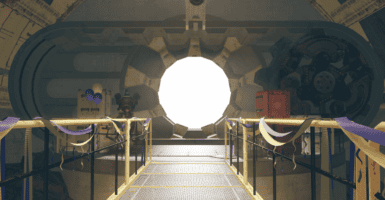Genomic Pioneer Says We’ll Be Able To Biologically Print Alien Life
This article is more than 2 years old

Clearly, 3-D printing has provided a great leap forward in terms of our ability to replicate and construct materials. We can make bacteria cages, miniature replicas of ourselves, dresses, entire rooms, food, and even moon bases, among other things. It seems there’s really nothing we can’t print out these days—including, apparently, alien life.
In 2001, three years after founding Celera Genomics, which focused on new sequencing techniques, scientist J. Craig Venter mapped the human genome. He also sequenced genomes for fruit flies, mice, and rats. In 2003, Venter genetically programmed a synthetic virus. In 2008, he developed synthetic bacteria, but it wasn’t until 2010 that he was able to get the synthetic DNA to self-replicate, thereby creating the first living synthetic organism. Basically, Venter is the daddy of DNA, the genie of genomes. What he does, thinks, and proposes in the field of genomics gets everyone’s attention—especially now.
In his new book, Life at the Speed of Light: From the Double Helix to the Dawn of Digital Life, Venter posits that computers will be able to create, or “print,” synthetic cells from specialized software. Scientists will be able to construct cells from scratch, which means the possibilities are virtually infinite. Venter also believes that computers and AI will be able to analyze genomic compositions and transmit genome sequencing units, possibly even to space, which could eventually aid us in the search for alien life by sequencing microbes that reside on other planets. Harvesting that information and sending it back to Earth could allow scientists to reconstruct the genomic sequences of whatever life forms we find.
Venter says that he’s confident Mars once harbored life, and that it still may. In his mind, we’re not too far from a time when our rovers and probes will contain these genome-sequencing units as a matter of course. He also thinks that if we develop a synthetic version of an alien genome, we could then recreate alien life on Earth using something akin to a biological 3-D printer.
Venter is talking about creating life from scratch via technology, a paradigm shifting idea that could facilitate profound changes for life on Earth and for our understanding of life in general. These ideas also raise numerous ethical questions, as do any ideas or processes that facilitate the creation of life. But he seems pretty immune to the Frankenstein Complex, and says he’s more afraid we won’t use technology, rather than being afraid we’ll abuse it. Or, I guess, that it will abuse us. We’ll see what he has to say when the alien life forms we create start self-replicating.












